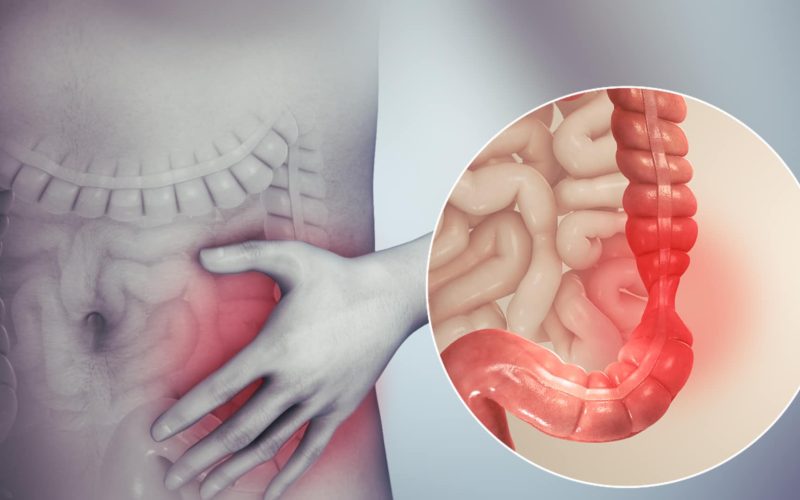The human digestive system contains structures that break down large compounds present in food and liquids and nutrients required by the body.
These nutrients, such as proteins and carbohydrates, are processed and taken to different areas of the body. Structures in the digestive system include stomach, small intestine, and large intestine.
The stomach is said to contain enzymes so strong, they are capable of digesting a razor blade. However, sometimes when these structures perform poorly for several reasons that could lead to a health crisis, one of these is called Irritable Bowel Syndrome.
Irritable Bowel Syndrome also known as nervous colon or spastic colitis is a long term gastrointestinal disorder of the large intestine and affects 6-8% of the human population.
It can cause severe lower abdominal pain, mucus in stool, diarrhea, irregular bowel movement, constipation and bloating.
Although there are no clear causes of irritable bowel syndrome, it can be triggered by changes in gut bacteria, diet, intestinal infection, genetic factors, sensitivity to food, and lack of sleep or stress.
Irritable Bowel Syndrome has no cure, however, treatments are available to improve symptoms of the disorder.
Since only a small number of people with IBS show severe symptoms, many are able to control their symptoms through changes in diet and lifestyle. Severe cases would be treated with medication.
While symptoms of irritable bowel syndrome may vary in intensity from person to person, these are the general symptoms you may experience if you have IBS.
Abdominal Pain
This is the most common symptom of irritable bowel syndrome and a key factor in diagnosing it. Digestion is controlled by the brain and the gut. This is done by the action of nerves, hormones, and signals released by the beneficial bacteria in your guts.
When irritable bowel syndrome occurs it distorts these signals, causing uncontrollable pain usually in the lower abdomen. Pain becomes less severe with bowel movements.
Constipation
This occurs when a person’s feces are too hard, making it difficult to expel from the anus. Constipation is a very common symptom of Irritable Bowel Syndrome and occurs in over half of the people living with it.
The distortion between the signals from the brain and the bowel may speed up or slow down the time and rate of bowel movement. When time slows the colon absorbed water from the food in it which results in hard fecal matter.
Constipation in irritable bowel syndrome often causes a sensation of incomplete bowel movement which leads to excessive straining of the anal muscles and long periods spent in the toilet. Drinking lots of water and the use of laxatives mitigates the effects of constipation.
Diarrhea
This is the frequent passing of loose, watery stools several times a day. A study conducted by Portincasa et al discovered that 200 people with Diarrhea-based Irritable Bowel Syndrome have on average 12 bowel movements a week compared to adults without it who have 6.
The opposite of constipation, accelerated time of bowel movement causes frequent loose stooling and immediate need to use the toilet. This can cause significant distress to the sufferer especially in social situations.
Bloating
The altered process of the digestive system due to Irritable Bowel Syndrome can lead to bloating. This is due to more gas production by the bacterial flora in the gut and it can be very uncomfortable.
Bloating is said to be a very persistent symptom of IBS, it is advised that food containing lactose should be avoided as it exacerbates the symptom.
Exhaustion and Difficulty Sleeping
Fatigue is a very common symptom of IBS. Irritable bowel syndrome leads to exhaustion and the person living with it to have limited energy to perform social functions such as work or school.
Irritable Bowel Syndrome can also lead to insomnia which is the difficulty in falling asleep. Poor sleep may, in turn, exacerbate gastrointestinal symptoms the following day.
Irritable Bowel Syndrome Diet
While medication and avoiding foods that trigger IBS symptoms is important in managing irritable bowel syndrome, do you know certain diets can improve your symptoms? Listed below are different types of diet for irritable bowel syndrome.
Low FODMAP Diet
FODMAP means “Fermentable Oligosaccharides, Disaccharides, Monosaccharides and Polyols.” FODMAPs are short-chained carbohydrates that are difficult to digest by the small intestine, create more gas and increase fluid in the bowels.
The increased production of gas by the colonic bacteria and fluid in the bowels leads to pain, bloating and diarrhea. Examples of FODMAP include:
- Lactose food such as cheese, ice cream, milk, and yogurt
- Fruits such as pears, mangoes, oranges, apples and watermelon which contains fructose
- Sweeteners
- Pasta and white bread
- Certain vegetables such as cauliflower, artichoke, and onions
Fiber Diet
A diet with high fiber content is highly recommended. Fiber adds bulk to your stools and helps the easy movement of bowel. According to the 2015-2020 Dietary Guidelines for Americans, the average adult should consume 22 to 34 grams of fiber a day.
Fruits, legumes and vegetables are great examples of food high in fiber and help with constipation.
However, fiber intake can also exacerbate symptoms of diarrhea and gas in people living with irritable bowel syndrome. It there therefore necessary to consume soluble fiber such as oats and carrots.
Gluten-Free Diet
Gluten is a type of protein found in cereals such as wheat, barley and rye and also in processed food.
Food containing gluten can trigger IBS symptoms and it is best you avoid them. Other foods you can eat include;
- Fruit: Bananas, blueberries, cantaloupe, grapefruit, honeydew, kiwi, lemon, lime, oranges and strawberries.
- Vegetables: Bamboo shoots, bean sprouts, bok choy, carrots, chives, cucumbers, eggplant, ginger, lettuce, olives, parsnips, potatoes, spring onions, and turnips.
- Protein: Beef, pork, chicken, fish, eggs and tofu.
- Nuts/seeds: Almonds, macadamia, peanuts, pine nuts, and walnuts.
- Grain: Oat, oat bran, rice bran, gluten-free pasta, such as rice, corn, quinoa, white rice, corn flour, wheat, and quinoa.
You can increase your calcium levels by consuming yogurt instead of other dairy products. Yogurt contains bacteria that can break down bacterial causes of IBS symptoms.
What food can trigger IBS?
Foods that may trigger IBS includes apples, cauliflower, beans, sweeteners such as sorbitol, fatty foods, dairy products such as butter and ice-cream, the juice from orange and grapefruit, chocolate, caffeine, margarine, and cabbages.
It is important that you keep a food journal to monitor food that may trigger your IBS symptoms. Also, you should speak to a medical professional before starting a new diet as they know best the kind of diet to recommend.







